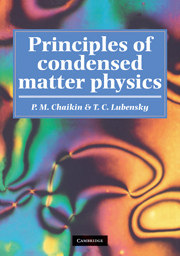Book contents
- Frontmatter
- Contents
- Preface
- 1 Overview
- 2 Structure and scattering
- 3 Thermodynamics and statistical mechanics
- 4 Mean-field theory
- 5 Field theories, critical phenomena, and the renormalization group
- 6 Generalized elasticity
- 7 Dynamics: correlation and response
- 8 Hydrodynamics
- 9 Topological defects
- 10 Walls, kinks and solitons
- Glossary
- Index
1 - Overview
Published online by Cambridge University Press: 05 June 2012
- Frontmatter
- Contents
- Preface
- 1 Overview
- 2 Structure and scattering
- 3 Thermodynamics and statistical mechanics
- 4 Mean-field theory
- 5 Field theories, critical phenomena, and the renormalization group
- 6 Generalized elasticity
- 7 Dynamics: correlation and response
- 8 Hydrodynamics
- 9 Topological defects
- 10 Walls, kinks and solitons
- Glossary
- Index
Summary
Condensed matter physics
Imagine that we knew all of the fundamental laws of nature, understood them completely, and could identify all of the elementary particles. Would we be able to explain all physical phenomena with this knowledge? We could do a good job of predicting how a single particle moves in an applied potential, and we could equally well predict the motion of two interacting particles (by separating center of mass and interparticle coordinates). But there are only a few problems involving three particles that we could solve exactly. The phenomena we commonly observe involve not two or three but of order 1027 particles (e.g., in a liter of water); there is little hope of finding an analytical solution for the motion of all of these particles. Moreover, it is not clear that such a solution, even if it existed, would be useful. We cannot possibly observe the motion of each of 1027 particles. We can, however, observe macroscopic variables, such as particle density, momentum density, or magnetization, and measure their fluctuations and response to external fields. It is these observables that characterize and distinguish the many different thermodynamically stable phases of matter: liquids flow, solids are rigid; some matter is transparent, other matter is colored; there are insulators, metals and semiconductors, and so on.
Condensed matter physics provides a framework for describing and determining what happens to large groups of particles when they interact via presumably well known forces.
- Type
- Chapter
- Information
- Principles of Condensed Matter Physics , pp. 1 - 28Publisher: Cambridge University PressPrint publication year: 1995
- 2
- Cited by



